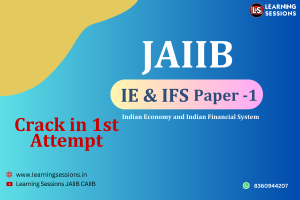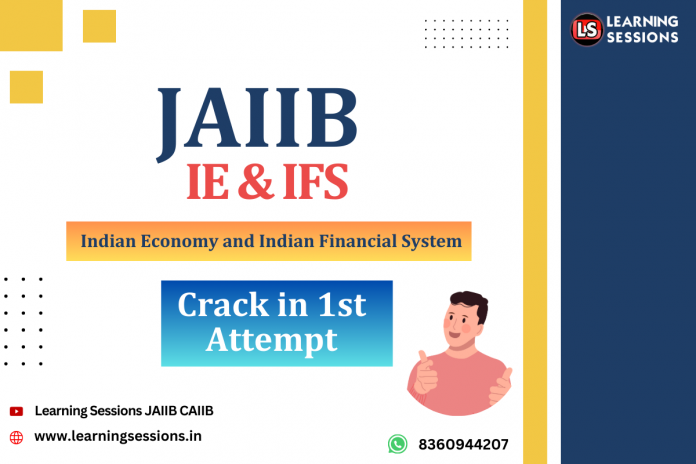Indian Economy and Indian Financial System (IE&IFS) is the first paper of the JAIIB exam. Bankers, constrained by their schedule, often struggle with time management and with the question of how to start. And what strategy to follow. This article aims to act as a guide for candidates to prepare for the IE&IFS paper, offering tips and strategies for the candidates.

📚 JAIIB Study Resources 📚
👉 Check Here
👉 Check Here
👉 Check Here
👉 Get Tests Here
👉 Check Here
Strategy to Prepare for the Indian Economy and Indian Financial System (IE&IFS) Paper
Step 1: Streamlining the syllabus
Before you start with streamlining, understand the complete syllabus of the IE&IFS paper-
There are 4 papers in the JAIIB exam pattern
Paper i – Indian Economy and Indian Financial System (IE& IFS)
Module A – Indian Economic Architecture
Module B – Economic Concepts Related to Banking
Module C – Indian Financial Architecture
Module D – Financial Products and Services
Paper ii – Principles & Practices of Banking (PPB)
Module A – General Banking Operations
Module B – Functions of Banks
Module C – Banking Technology
Module D – Ethics in Banks and Financial Institutions
Paper iii – Accounting & Financial Management for Bankers (AFMB)
Module A – Accounting Principles and Processes
Module B – Financial Statement and Core Banking Systems
Module C – Financial Management
Module D -Taxation and Fundamentals of Costing
Paper iv – Retail Banking and Wealth Management (RBWM)
Module A – Retail Banking
Module B – Retail Product and Recovery
Module C – Support Services- Marketing of Banking Services/Products
Module D – Wealth Management
By streamlining the syllabus, you get an idea about the key concepts of the paper and areas of focus more clearly, mitigating the overwhelming scope of the exam syllabus. This allows you to concentrate on your studies, optimising your time, effort and energy.
Step 2: Analyse PYQs diligently
PYQ analysis will be your first small step and a break for concrete preparation. Previous year questions serve as direction and orientation to your preparation. In addition, you will get an idea of the difficulty level of the exam as well as the type of questions asked enabling you to plan your strategy accordingly and focus on the specific topics.
Step 3: Prioritise Modules
Prioritising modules ensure that you allocate more time to important topics that carry higher weightage in the paper. Thinking about which module to start with?
Follow the below-mentioned sequence in which you should start your preparation–
1. Commence with Module – D
The Maximum number of questions are covered in Module D, thus holding the place of the most important module to start your preparation with. The module consists of extremely important topics such as the Money Market, Capital Market, Derivative Market, Foreign Exchange, Lease Financial, and Venture Capital.
2. Then start Module – B
Module B is the second most important which covers case studies too. The important topics of the modules are-
Fundamentals of Economics, Microeconomics, Macroeconomics, Types of Economies, Supply and Demand, Money Supply and Inflation, Theories of Interest, Business Cycles, Union Budget, Monetary Policy and Fiscal Policy etc.
3. Move to Module – C
Module C is the third most important and covers topics-
Indian Financial System – An overview, Indian Banking Structure, Banking Regulation Act, 1949 and RBI Act, 1934, Development Financial Institutions, Micro Finance Institutions, Non-Banking Financial Companies, Reforms & Developments in the Banking Sector.
4. At the end, start for Module – A
The important topics for Module A are-
An Overview of the Indian Economy, Role of Priority Sector and MSME in the Indian Economy, Sectors of the Indian Economy, Foreign Investments, Economic Planning in India and NITI Aayog, Economic Reforms, Foreign Trade Policy, and Economic Development.
IE & IFS Syllabus Priority Video
Step 4: Be consistent
Consistency in preparation is essential. You don’t have to give extra hours every day but as a minimum, you need to be at a level that even on a bad day you get points on the board. So, chart out your own strategy, Formulate your fitting timetable, and go ahead.
Step 5: Attempt Mock Tests and Mega Tests
Try to attempt as many mock and mega tests as you can which will give you an idea of the difficulty level of the exam and will also improve your performance for the real exam day.
Step 6: Make your effective short notes
Prepare short notes of important points in an appropriate structure so that it becomes easier for the aspirants to memorise and recollect.
Step 7: Identify Effective Study Material and Resources
- Website: There are many online study material resources for the preparation of the IE & IFS paper. These resources provide mock tests, previous year questions, Epdfs etc.
- YouTube: Learning Sessions YouTube channel is a rich source of JAIIB exam preparation. provides free insightful tutorials and explanations on important IE&IFS topics, allowing you to understand complex IE&IFS topics through quality video lectures.
General Tips
- Make a timetable to suit your specific needs.
- Take short breaks between sessions.
- Don’t stress out.
- Keep practising mock tests to improve your performance.
- If you are taking JAIIB course coaching, stick with their study material only.
A strategic and comprehensive approach is required for preparing for the IE&IFS paper. Clearing the JAIIB exam is a dream of many aspirants and following the effective strategies along with dedication, consistency and effective study material, the year 2024 can be a transformative year for the candidates.
FAQs
Q1. What is JAIIB IE & IFS?
IE & IFS (Indian Economy and Indian Financial System) is the first paper of JAIIB.
Q2. How many questions are there in the JAIIB IE&IFS paper?
The JAIIB IE & IFS paper consists of 100 questions.
Q3. Which Module of IE& IFS is most important?
Module D of the paper IE& IFS is the most important module.
Q4. Which is the second most important module of IE& IFS?
Module B is the second most important module of IE & IFS paper.
Q5. What type of study materials resources are available for the preparation of the IE& IFS paper?
Books, YouTube Videos, Epdfs, Mock tests, Previous Year Questions etc.





